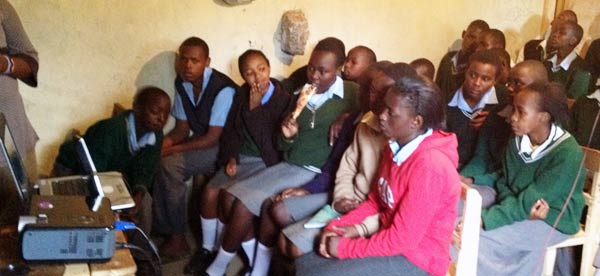
|
TeachAids software supplements after school health club meetings for Kenyan youth
Despite limited power and the patter of rain on the school’s tin roof, Comfort the Children International (CTC) successfully shared the TeachAids program with approximately 70 secondary students at Bishop Waichere Secondary School in Maai Mahiu, Kenya on June 8, 2012. Students and CTC health educators huddled close on wooden benches to share one computer with small portable speakers in the narrow classroom. Bishop Waichere served as the "pilot test" location for integrating TeachAids material into the CTC afterschool health education curriculum.
CTC, a nonprofit organization working alongside Kenyan communities to promote sustainable change and community development, offers free testing for HIV and AIDS and community outreach through education, prevention, and treatment across age groups. Their afterschool health education program empowers youth with skills to protect themselves against HIV infection and live healthy lives. According to CTC, 1.6-1.9 million people live with HIV in Kenya and prevalence in Maai Mahiu is particularly high due to its location on a major trade route termed the “HIV Highway.” People living with HIV in Maai Mahiu suffer from stigma, extreme poverty, and limited economic opportunities. CTC is working to improve livelihoods for these people, combat the stigma of HIV testing, and promote prevention through education and empowerment.
To warm up for the weekly afterschool health program, CTC health educators lead students in a series of songs and games, which promote a relaxed environment where students can ask tough questions about HIV and AIDS. At Bishop Waichere, following the TeachAids presentation, students participated in a lively discussion with CTC health educators and topics ranged from misconceptions about HIV transmission to basic questions regarding prevention. CTC health educators used large pieces of paper to write down student responses and reemphasize concepts from the TeachAids software including the “high risk fluids” and the “triangle test,” coined by TeachAIDS.
In response to the TeachAids materials, CTC Program Coordinator Belinda Atieno noted, “It was such a wonderful time, and I am seeing a very positive impact because the information from the TeachAids materials was really simplified and it’s easy even for the students to like relate with. It’s easy for them to understand the information.”
Health educator Rahab Wanjera added that she “liked [the TeachAids software] very much because it is quite detailed, very simplified, and quite understandable by the teachers and the students.” Rahab also noted that the TeachAids materials “helped us today to clarify some of the misconceptions about HIV for example about whether mosquitos can transmit HIV. … This is one of the misconceptions we’ve got here in Kenya, and another one being whether saliva is one of the modes of HIV transmission, of which we’ve gotten the answers from the film.”
With the resounding success of TeachAIDS software among educators and youth, CTC has quickly begun to integrate the TeachAIDS materials into their health education programs in Maai Mahiu. The TeachAids program already has been used at five different secondary schools in Maai Mahiu, reaching over 300 Kenyan youth.
TeachAids commends the efforts of CTC to educate and empower the Kenyan youth through education. The Teacids software has also been used with other partners working in Kenya including A Better Education Club in Bungule, Rukanga, Jora, Kiteghe, and Makwasinyi, the Dignitas Project in Mathare Valley, and the Development Office of the Catholic Diocese in Kisii.
Photo: Comfort the Children International shares the TeachAids software with secondary students in Maai Mahiu, Kenya.